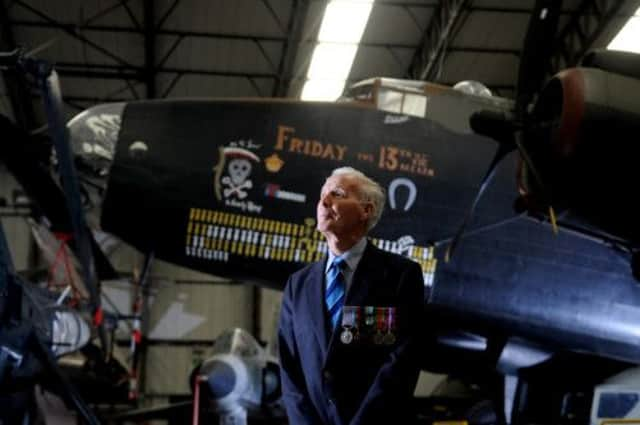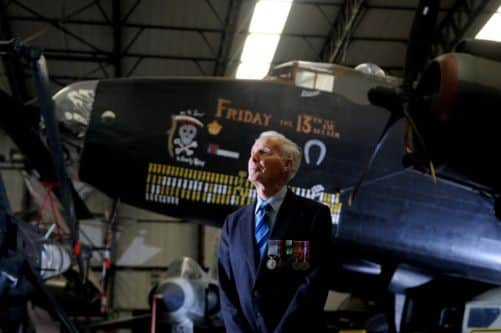A poignant journey for Friday the 13th’s ‘lucky one’


The young wireless operator and his colleague, Sergeant Rodney Neary, remained calm, extinguishing the fire despite an exploding ammunition container and injuries to a crew member.
The target was successfully attacked and both men were later awarded the Distinguished Flying Medal for their coolness during a critical period and for their devotion to duty.
Advertisement
Hide AdAdvertisement
Hide AdThe citation said: “These airmen have completed a large number of sorties and have displayed determination and devotion to duty of a high order.”


Yesterday Mr King, who turns 90 this week, proudly wore the medal as he climbed inside the cramped fuselage of a replica of the aircraft he flew, a restored Halifax bomber – now the only one in Europe – at the Yorkshire Air Museum, near York.
Sitting in the wireless operator’s seat once again, he said it was a moment he had waited 70 years for.
“It’s been 70 years but I have been longing to do this. The space is smaller than I remember it but the Morse key is exactly the same. I used to call this my office.
Advertisement
Hide AdAdvertisement
Hide Ad“It’s very emotional but it’s good to be back. On some missions I used to sit here for over eight hours. The Stuttgart mission was eight hours and 40 minutes. I remember that it was bloody cold and it was noisy.
“I recall looking out of the window at the exhaust pipe which was glowing red hot.
“It worried me at first but it was the cold inside the aircraft that worried us most of all. Sometimes it was so cold we wished something would happen so we could get out.”
Mr King, who was with 158 Squadron at RAF Lissett, near Bridlington in 1944 and 1945, is the sole surviving member of the crew of a Halifax bomber that his pilot boss nicknamed Friday the 13th in an attempt to end what crew believed was a ‘jinx’.
Advertisement
Hide AdAdvertisement
Hide AdThe aircraft went on to complete 128 operational sorties in 13 months, a record unsurpassed by any other Halifax in Bomber Command.
Mr King, who completed 29 missions aboard Friday the 13th, recalled that not everyone on the base was happy with the aircraft’s unusual name. “The Squadron Leader came along after we had named it (and had it painted).
“He said ‘if I have to fly that thing I will need a gallon of thinners first’.”
“I think we were all superstitious. I used to tap the side as I went in. The ground crew used to bet on who would be the first (aircraft) back.
Advertisement
Hide AdAdvertisement
Hide Ad“I overheard someone saying it won’t be who is first back but who is coming back. When I heard that I thought ‘God Almighty’.”
He was right to be concerned. A total of 851 men and women based at RAF Lissett lost their lives during the war.
Mr King, a retired shoe company director who now lives in Ipswich, knew many of them and was close friends with some of those who did not make it back from bombing missions.
“Some days you would go in the mess and a couple of days later half of them had gone.
Advertisement
Hide AdAdvertisement
Hide Ad“A friend of mine, Len Dwan, was a wireless operator who lived in London. We were good friends right from the word go and I used to stop at his house.
“I heard that he had been badly injured and had bailed out. I presumed he had died but later I looked in books and tried to find out more. I couldn’t find out any more.
“Then I went to the 158 Squadron memorial at Lissett. It really upset me when I saw his name. It was very emotional.”
Mr King recalled the first time he set eyes on the huge Halifax bomber, with its four engines and seven-man crew. “I didn’t think it would ever get off the ground. I was happier in a Halifax than a Lancaster. The thing about the Halifax, although we lost more aircraft, it was comparatively easier to get out of if you got shot up.
Advertisement
Hide AdAdvertisement
Hide Ad“Back then we were 20-year-olds and all enthusiastic for the first four or five operations. After that we began to get a bit more sensible.
“My first op was Berlin – we were just like kids. As we got over the target there was anti-aircraft fire. I had never seen a sight like it – it was terrible. It was also terrible for the people underneath.”
Mr King was accompanied on his return visit to Yorkshire by his son Bryan, who said: “We are all very proud of him. To think they went up in the air at the age of 20 and 21.”
Son-in-law Ivan Smith said: “My father-in-law is the only crewman left of the first crew who named the plane Friday the 13th. There is sadness because Eric lost a friend who had introduced him to his future wife. He was lost and his body never found. His name is on the Lissett memorial. When Eric saw it he commented ‘I was one of the lucky ones’.”